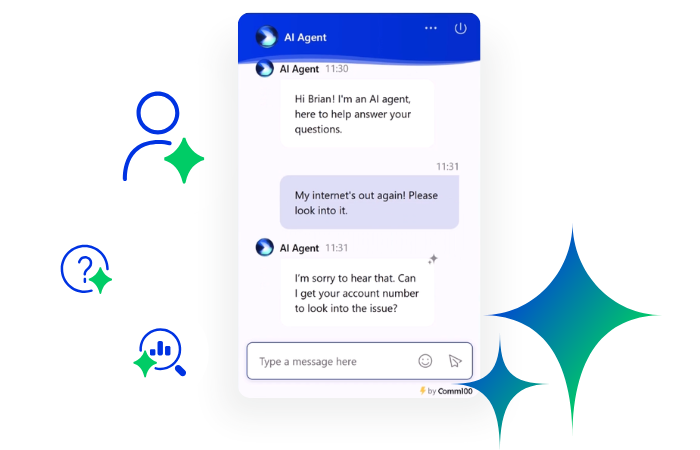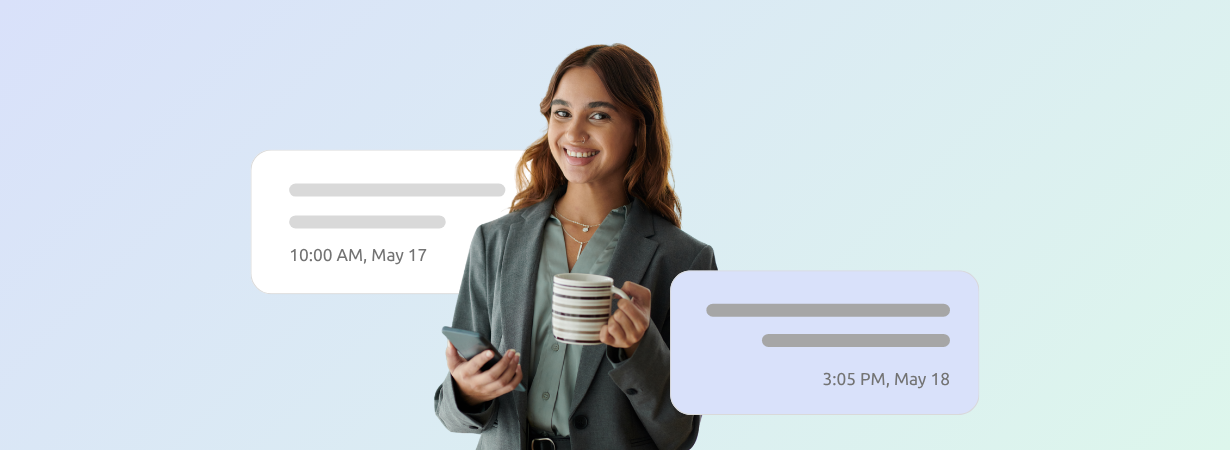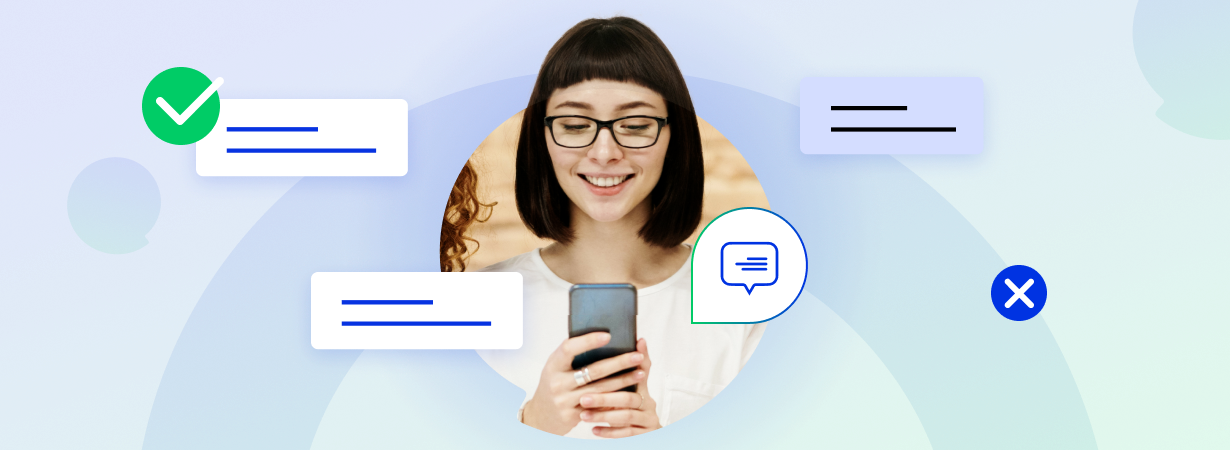So, you’ve decided to add live chat software to your website. Congratulations! You’re on your way to more meaningful, personalized interactions for your customers.
Your next step is live chat software review – evaluating your options and deciding which one is the best fit for your business. But, with so many live chat options, how do you know which one to choose?
When considering live chat, make sure to ask potential vendors these top 8 questions.
Do You Have These Features?
This is the first and arguably one of the most important questions you should be asking when scoping out live chat vendors. An enterprise-level live chat solution should offer robust features that can not only fulfill your business needs, but also increase agent productivity and offer powerful insights into each customer interaction.
Start slow and consider which live chat features are non-negotiable. This could be something like chat routing to make sure each and every chat is handled by a subject matter expert. Look at both your internal business needs and external customer needs to compile a list of must-have live chat features. If a potential live chat vendor does not have the features on your must-have list, then it’s time to move on.
Once you’ve nailed down your must-haves, think about other categories – like should-haves or nice-to-haves. For example, features like the ability to adjust chat window size would fall under a “nice-to-have”: something that would be great if included, but not a deal breaker.
Recommended for you: The 7 Best AI Live Chat Software for the Most Common Customer Support Use Cases
What’s the cost?
When considering live chat vendors, make sure you understand their pricing model and if you’re getting the most bang for your buck. Some providers charge a fixed rate per agent while others charge per chat, which can be difficult to budget for if you expect to field a high chat volume. Ensure you know what exactly is included in the price and if there are additional extra charges.
A pricing structure may include:
- Recurring charges: These are the ongoing fees that you pay. These may be charged by user or by chat volume, monthly or annually.
- Additional charges: Technical support, software upgrades, backups, and maintenance all fall under this category.
- Termination policy: If you terminate the contract early, will you receive a refund or have to pay a penalty? Make sure that the termination policy is laid out in detail.
- Discount policy: There may be discounts for factors like multiple sites, non-profit status, schools, etc. Be sure to ask what discounts may be available to you.
If a vendor’s pricing model isn’t made clear from the start, it may cost you in the long term.
Can I integrate live chat with my current systems?
If your company is using a CRM, knowledge base, or ticketing solution then your live chat should be able to integrate seamlessly. Doing so will give you a more comprehensive view of your customers and the ability to craft more personalized, targeted messages.
Live chat software usually integrates with systems like:
- Customer Relationship Management (CRMs)
- Helpdesks
- Ticket systems
- Call center systems
- Google Analytics
- Social media platforms such as Facebook, Twitter, WeChat, and Google+
For particularly complex tech ecosystems, live chat vendors should be able to offer APIs to communicate with a wider variety of systems.
Live chat should enhance your customer communication strategy by integrating with what you already have. Ensure the vendor you choose is capable of integrating seamlessly with the systems you need and use.
What reports do you provide?
Generally, there are 2 kinds of reports. The first offers detailed and aggregate information about your agents. This type of report answers questions including: what does your chat volume look like? How quickly do agents answer chat requests? How long does it take to resolve queries? And so on. These reports can give detailed insights into your support team’s performance on both a departmental and individual level, while helping optimize agent efficiencies and workflows.
The second type of report is for customers. A robust live chat solution should make use of customer information you already have, and further add valuable data. Chats are logged into the existing customer profile, so your business can track these touchpoints and use this data to delivery targeted messages and interactions.
Ask what reports are offered, which key metrics are tracked, and how they are calculated. Make sure you understand the reports and the numbers you receive, so that you can maximize your live chat return on investment (ROI). It may also be helpful to be able to export report data for offline access, blending with other customer data, and visualization in a business intelligence (BI) platform.
How customizable is the live chat interface?
Customization is important to companies that want to align their live chat solution with brand and website standards. After all, live chat is another direct customer touchpoint for your company. You want your live chat to look and feel like a professional and seamless part of your organization’s online identity.
Ask what the customization capabilities are for the chat button and the chat window. This should include the color, size, text, shape, position, and so on. You should be able to change all visual aspects of live chat.
Want some help getting started? We’ve compiled an extensive list of questions covering live chat features, pricing, security and more in our RFP template.
How reliable is your live chat solution?
Part of what makes live chat better than traditional support channels is that it offers customers a fast and accessible direct touchpoint to your company. But if a vendor is plagued by constant downtime, you’ll be unable to service your customers effectively, which can cost you in the long run. If a customer tries to chat, and your live chat is temporarily unavailable, you not only lose the customer, but frustrate them as well. Once this happens, that visitor is unlikely to return to that channel.
When asking about your live chat vendor’s uptime record, keep in mind the industry standard for availability is no less than 99.9%. Live chat uptime is a measure of system availability, and any potential provider should willingly share their uptime stats with you.
You can calculate the system availability based on the uptime record. The following table shows you how a seemingly small difference in uptime can make a big difference to your users and customers.
| Availability |
Total Annual Downtime |
| 99% |
15 hours, 36 minutes |
| 99.9% |
8 hours, 45 minutes, 36 seconds |
| 99.99% |
52 minutes, 33 seconds |
| 99.999% |
5 minutes, 15 seconds |
Be sure to ask your potential provider if their downtime includes scheduled maintenance time. If not, you can expect longer downtimes than those listed in the table above.
What security measures does your live chat offer?
In these days of data breaches and cyber hacks, robust security for your live chat solution is essential.
In these days of data breaches and cyber hacks, robust security for your live chat solution is essential. Ensure you ask what security measures are in place and how your data will be protected.
Specifically, ask any potential vendor about:
- How the vendor prevents unauthorized access to your data
- What firewalls are in place to protect from data attacks
- The vendor’s data backup plan and disaster recovery mechanism
- The vendor’s privacy policy, and compliance with recognized industry standards including ISO 27001, PCI DSS and HIPAA.
What Level of Support Do You Provide?
Live chat is a customer-facing application, and when there are issues, you need fast, effective support.
Industry-standard support usually includes:
- 24/7 live chat support
- Phone and email support
- Self-service options like knowledge-base articles, videos and user manuals
Make sure you get a copy of the vendor’s SLA (Service Level Agreement). Consider what’s outlined in the agreement and if it meets your business support needs. For example, if you are an enterprise-level organization, you should ask if the vendor provides dedicated account managers or tailored training services.
Your customers are the most important asset to your organization, and your vendor should hold a similar customer-centric focus. Live chat can build satisfying, long-term relationships with customers who can help build your business. Done wrong could result in deterring prospects and losing customers. When considering vendors, make sure to keep these questions top of mind and use a vendor’s answers to make sure you get the best solution for your business needs for the long run.
Powerful live chat software
Offer real-time, personalized, efficient support that your customers and agents will love at 1/3 the cost of voice support.
Learn more
Comm100 Live Chat







